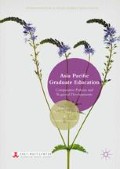Abstract
As Cuthbert and Molla (2015, p. 33) argue, “[c]ontemporary higher education (HE) systems function within a political context of high optimism about the transformative potential of knowledge for individuals and for national economies.” “Knowledge economy optimism” is prevalent across Europe, North America, South East Asia, and China, as well as Australasia. HE and, more specifically, research and its potential for innovation are ubiquitously positioned as the drivers of future economic and social prosperity. As shown in a recent report of Organization for Economic Cooperation and Development (OECD), doctoral graduates are considered central to this endeavor given that they are trained specifically in research with the explicit aim of most national governments of building innovative and competitive economies (Auriol et al. 2012). Such policy assumptions are predicated on PhD programs capable of producing graduates both willing and able to drive innovation and social and economic advancement. In Australia, this is reflected in the now firmly established conception of PhD education as “research training,” clearly echoing a labor market preoccupation. But to what extent do PhD candidates and graduates share—or participate—in such policy visions? This chapter explores this issue through a focus on researcher motivations.
Access this chapter
Tax calculation will be finalised at checkout
Purchases are for personal use only
References
Academics Anonymous. 2014. “Why I’m Leaving Academia.” The Guardian, May 10, 2014. http://www.theguardian.com/higher-education-network/blog/2014/may/01/academic-anonymous-leaving-academia
Akerlind, G. 2008. An Academic Perspective on Research and Being a Researcher: An Integration of the Literature. Studies in Higher Education 33: 17–31.
Archer, L. 2008. Younger Academics’ Constructions of ‘Authenticity’, ‘Success,’ and Professional Identity. Studies in Higher Education 33: 38–403.
Auriol, L., M. Schaaper, and B. Felix. 2012. Mapping Careers and Mobility of Doctorate Holders: Draft Guidelines, Model Questionnaire and Indicators–Third Edition. OECD Science, Technology and Industry Working Papers, No. 2012/07. Paris: OECD Publishing.
Australian Academy of Science (AAS). 2014. “Submission to the Senate Economic References Committee Inquiry into Australia’s Innovation System.” Accessed April 13, 2015. http://www.science.org.au/sites/default/files/usercontent/australiasinnovationsysteminquiry.pdf.
Bowen, W., and N.L. Rudenstine. 1992. In Pursuit of the PhD. Princeton: Princeton University Press.
Brailsford, I. 2010. “Motives and Aspirations for Doctoral Study: Career, Personal, and Inter-Personal Factors in the Decision to Embark on a History PhD.” International Journal of Doctoral Studies 5: 15-27.
Brew, A., D. Boud, and S.U. Namgung. 2011. Influences on the Formation of Academics: The Role of the Doctorate and Structured Development Opportunities. Studies in Continuing Education 33: 51–66.
Carr, K. 2013. Future Fellowship Consultation Paper. Accessed September 24, 2014. http://www.arc.gov.au/pdf/future_consultation.pdf.
Chung, J.Y., and J. Petrick. 2011. Doctoral Students’ Research Productivity: An Analysis of Publications in Tourism and Hospitality Journals. Journal of Hospitality, Leisure, Sport & TourismEducation 10: 63–71.
Cuthbert, D. and T. Molla. 2015. “PhD Crisis Discourse: A Critical Approach to the Framing of the Problem and Some Australian ‘Solutions.’ Higher Education 69: 33–53.
Dever, M., P. Boreham, M. Haynes, M. Kübler, W. Laffan, K. Behrens, and M. Western. 2008. Gender Differences in Early Post-PhD Employment in Australian Universities: The influence of PhD Experience on Women’s Academic Careers. Brisbane: The University of Queensland Social Research Centre.
Elizabeth, V., and B.M. Grant. 2013. ‘The Spirit of Research Has Changed’: Reverberations from Researcher Identities in Managerial Times. Higher Education Research and Development 32: 122–135.
Gardner, S.K. 2009. Conceptualizing Success in Doctoral Education: Perspectives of Faculty in Seven Disciplines. The Review of Higher Education 32: 383–406.
Grove, W.A., and S. Wu. 2007. The Search for Economic Talent: Doctoral Completion and Research Productivity. The American Economic Review 97: 506–511.
Guerin, C., A. Jayatilaka, and D. Ranasinghe. 2014. Why Start a Higher Degree by Research? An Exploratory Factor Analysis of Motivations to Undertake Doctoral Studies. Higher Education Research & Development 34(1): 89–104. doi:10.1080/07294360.2014.934663.
Hakala, J. 2009. The Future of the Academic Calling? Junior Researchers in the Entrepreneurial University. Higher Education 57: 173–190.
Kim, K., and S.J. Karau. 2010. Working Environment and the Research Productivity of Doctoral Students in Management. Journal of Education for Business 85: 101–106.
Leonard, D., R. Becker, and K. Coate. 2005. To Prove Myself at the highest Level: The Benefits of Doctoral Study. Higher Education Research & Development 24: 135–149.
McAlpine, L., and C. Amundsen. 2009. Identity and Agency: Pleasures and Collegiality Among the Challenges of the Doctoral Journey. Studies in Continuing Education 31: 109–125.
Mokhtar, M. 2012. Intentions and Expectations of Female PhD Students in Engineering at One University in Malaysia. Procedia—Social and Behavioral Sciences 56: 204–212.
Rodwell, J., and R. Neumann. 2008. Predictors of Timely Doctoral Student Completions by Type of Attendance: The Utility of a Pragmatic Approach. Journal of Higher Education Policy and Management 30(1): 65–76.
Royal Society of Chemistry. 2008a. Change of Heart: Career Intentions and the Chemistry PhD. London: Royal Society of Chemistry.
———. 2008b. The Chemistry PhD: The Impact on Women’s Retention. London: Royal Society of Chemistry.
Sinclair, J., R. Barnacle, and D. Cuthbert. 2013. How the Doctorate Contributes to the Formation of Active reseArchers: What the Research Tells Us. Studies in Higher Education 39: 1972–1986.
Stein, S. 2014. “America’s Top Young Scientists Warn of Systemic Brain Drain: Colleagues ‘Sort Of Disappear’.” Huffington Post, May 10, 2014. Accessed September 25, 2014. http://www.huffingtonpost.com/2014/04/16/science-brain-drain_n_5161295.html
Teytelman, L. 2014. “Goodbye Academia.” Yes, Another Science Blog, February 14, 2014. http://anothersb.blogspot.com.au/2014/02/goodbye-academia.html.
The Australian Research Council. 2013. “Evaluation of the Future Fellowships Funding Scheme 2013.” Accessed September 24, 2014. http://www.arc.gov.au/pdf/FT%20Evaluation%20Report/FT_Evaluation_Report.pdf.
Turner, G., and L. McAlpine. 2011. Doctoral Experience as Researcher Preparation: Activities, Passion, Status. International Journal for Researcher Development 2: 46–60.
Watson, J.D. 2001. The Double Helix: A Personal Account of the Discovery of the Structure of DNA. New York: Touchstone.
Author information
Authors and Affiliations
Editor information
Editors and Affiliations
Copyright information
© 2016 The Editor(s) (if applicable) and The Author(s)
About this chapter
Cite this chapter
Barnacle, R., Cuthbert, D., Laurie, R. (2016). Exploring Researcher Motivation: Implications for PhD Education. In: Neubauer, D., Buasuwan, P. (eds) Asia Pacific Graduate Education. International and Development Education. Palgrave Macmillan, New York. https://doi.org/10.1057/978-1-137-54783-5_12
Download citation
DOI: https://doi.org/10.1057/978-1-137-54783-5_12
Published:
Publisher Name: Palgrave Macmillan, New York
Print ISBN: 978-1-137-54782-8
Online ISBN: 978-1-137-54783-5
eBook Packages: EducationEducation (R0)

